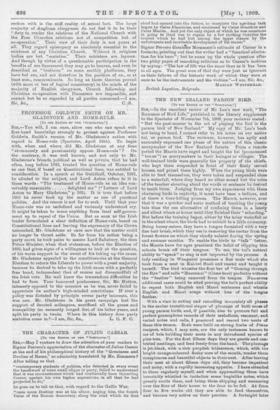TEE CHARACTER OF JULIUS CAESAR.
[To TR) EDITOR Or TIM "liPROTATOR.1 SIE,—May / venture to draw the attention of your readers to Signor Ferrero's appreciation of the character of Julius Caesar at the end of his philosophical history of the "Greatness and Decline of Rome," so admirably translated by Mr. Zimmern P After telling us that "contemporary students of politics, who detected in every event the handiwork of some small clique or party, failed to understand that it was circumstances which had continually been thwarting Caesar, against his own higher aspirations, in all that he had projected to do," he goes on to tell us that, with regard to the Gallic War,
"once more Destiny was at his elbow, urging him, the fourth Caine of the Roman democracy, along the road which its first
ohiof had opened into the future, to complete the age-long task begun by Caine Flaminius, and continued by Calm Graechus and Caius Marius. And yet the only object of whieh he was conscious in going to Gaul was to regain by a few striking victories the respect which ha had lost among the upper Classes by the unfortunate and inevitable development of his career."
Signor Ferrero dismisses Monamsen's estimate of Caesar in a footnote, pointing out that the writer had a "fanatical adenira.
tion for his hero"; but he sums up the whole question after two pithy pages of searching criticism as to Caesar's motives by saying: "The law of life was the same then as it has been in all ages. The great men of that day were just as ignorant as their fellows of the historic work of which they were at once to be the instruments and the victims."—I am, Sir, dm,' British Legation, Belgrade.
MARIAN WHITEHEAD.










































 Previous page
Previous page